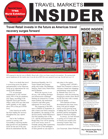 by Jim Perry, Brown-Forman Senior Vice President, India, Middle East & Africa, Central and South America
by Jim Perry, Brown-Forman Senior Vice President, India, Middle East & Africa, Central and South America
 The Cannes 2016 edition of Travel Markets Insider discussed the issue of grey market trading (i.e. parallel trade) and its potential impact on the travel retail industry. This debate needs to continue. Parallel trading poses several serious risks to the travel retail industry.
The Cannes 2016 edition of Travel Markets Insider discussed the issue of grey market trading (i.e. parallel trade) and its potential impact on the travel retail industry. This debate needs to continue. Parallel trading poses several serious risks to the travel retail industry.
I have been fortunate to have been involved with travel retail for over a decade as Brown-Forman began expanding into the market and I was asked to lead the talented team building the company’s global organization. Today, I am now leading the company’s efforts to expand into several emerging markets across India, the Middle East, Africa, and South America. I believe that my experience leading a global travel retail organization and a large, local economy business, provide me with a good view of the dangers continued parallel trade poses to travel retail.
The threat to travel retail can be categorized into three areas: 1) brand health, 2) reputation with suppliers, and 3) corruption.
First, let’s look at brand health. Brands become stronger and more attractive to consumers when their stake holders make investments leading to increased consumer interaction and adoption. In order to make the right investments, brand owners need accurate market data.
Travel retail industry participants who engage in parallel trade harm brand health. Instead of participating in brand investment, they are simply taking advantage of the work and investment undertaken by others. In effect, they are swooping in to make a quick return without any contribution. Additionally, parallel trade deprives brand owners of the data that they need to ensure continued brand health. The lack of investment and data ultimately put at risk a brand’s long-term health.
Why should the travel retail industry care about brand health? Isn’t that the brand owner’s problem? True, ultimately suppliers must protect their brands. But, it is the major international brands that draw people into stores. Without healthy, well known, global brands, consumers will have less incentive to enter a travel retail store. So, those operators who continue to participate in parallel trade put at risk the health of the very brands that are driving consumers to their stores.
The second threat is damage to travel retail’s reputation inside the executive offices of major brand owners. It is not a secret that travel retail is often one of the less profitable sales channels. Suppliers must constantly evaluate the efficiency and return of their marketing investments.
The commercial world is also rapidly changing. Today, suppliers have many more consumer contact options than in the past. With ecommerce and almost immediate home delivery, gone are the days of limited points of sale. Additionally, the value of travel retail’s “shop window” is eroding. Consumers now have an almost unlimited number of ways in which to interact with brands. From a marketer’s perspective, the explosion of modern media options provides countless ways in which to communicate with consumers. Unlike in-store experiences, the new modern media ways of consumer interaction are highly targeted and offer a cost effective way for brand owners to communicate with consumers, thereby threatening the value of the shop window and its “captured consumer.”
In light of the changed retail and marketing landscape and the channel’s relatively low profitability, parallel trade coming from travel retail can hurt the channel’s reputation in the eyes of supplier management. Brand owners must ask themselves whether an investment is going to generate a better return in travel retail or the local economy, particularly when participating in travel retail could bring parallel trade related brand health damage. Ultimately, the low profitability and danger of harming brand health can lead to a negative reputation. This negative reputation could result in suppliers putting more attention and focus on new sales and communication opportunities and reducing investments flowing into travel retail.
The third area of threat from travel retail supplied parallel trade is the possibility of legal and criminal penalties. By its very nature, parallel trade occurs out of sight. This is often where criminal elements operate. We have all heard the stories where parallel products are imported into markets without paying appropriate taxes or in violation of other local laws. Often these products enter a destination country after some form of corrupt behavior facilitates their importation. Today, tolerating that type of corrupt behavior can easily lead an operator into dangerous legal waters.
As an industry, we cannot ignore corruption risks. The U.S. has recently enhanced its already aggressive anticorruption enforcement. The U.K. is increasingly enforcing its laws and France intensified its anti-corruption efforts with adoption of a new law. Other nations are following suit by passing new legislation, increasing enforcement and working together in a coordinated manner to root out corruption. Many of these provisions have extra-territorial jurisdiction, allowing authorities to bring charges for activities that occur in other nations. The consequences of running afoul of these laws are drawn out investigations that can cost millions of dollars to defend and millions more to settle. Additionally, there is the possibly of criminal sanctions for executives either directly involved in the corrupt activities, or on notice that they were likely occurring.
The sting of anti-corruption enforcement has been felt by many consumer goods manufacturers. As a result, many manufacturers have heeded the advice of the enforcement agencies and implemented controls designed to identify, avoid or mitigate potential corruption risks in their supply chains and routes to market, including: due diligence on prospective third parties, ongoing monitoring of existing third party relationships, in-person training, and contracts with anti-corruption, audit and termination clauses. The future will see even more of this activity.
Although suppliers have taken steps to address corruption risk, travel retail operators and traders would benefit significantly from implementing similar anti-corruption controls. Take a scenario where an operator sells excess inventory to a trader for resale into another market. Does the operator know what happens to the sold product? Do they pass through appropriate legal channels or are they smuggled, with bribes paid to government officials to look the other way? As enforcement becomes more sophisticated, it is not a stretch for authorities to increase their focus on “who” diverted the product into an ultimately illicit trade route and ask whether they had sufficient to reason to believe that corrupt activities were occurring that benefited their sales.
Operators and traders cannot simply turn a “blind eye” to these potential risks. In fact, ignoring or failing to follow up on signs of potential corruption risks only creates more liability. Implementing strong anti-corruption controls demonstrates a commitment to law enforcement, business partners, and consumer that as an industry, we won’t bend to an opportunity to make a quick sale that undermines legitimate trade.
While these threats are serious and pose a threat to the long-term viability of the travel retail industry, it is not realistic to expect parallel trading to disappear. For as long as humans have traded goods across borders, entrepreneurs have arbitraged prices. That behavior will not go away. But, there are several things that we as an industry can do to address the threat, working on both the supply and demand fronts.
From the supply side, first, and easiest, suppliers should stop looking the other way when they know, or should have reason to know that a customer is engaging in product diversion. As suppliers, we cannot blow the whistle on the problem and not accept some of the responsibility for its mitigation.
Second, operators that are engaging in parallel market practices should stop. This will also require closer cooperation between suppliers and retailers to make sure inventory is kept at appropriate levels. It will require a partnership for more sophisticated demand planning, inventory replenishment and data sharing so that retailers are not stuck with high inventories and have no recourse but to try and sell on their supplies into the parallel market.
Third, both suppliers and operators should look at their compliance efforts to ensure that they have policies and procedures in place to mitigate the risk of dealing with customers who are potentially engaged in corrupt activities.
On the demand side, working with government authorities, the industry should partner to make smuggling a losing proposition. Jointly encouraging national governments to crack down on illegal importation will make it harder for smugglers to continue their operations.
There also may be a role for travel retail trade associations to play in certifying that their members engage in legitimate business practices.
Ultimately, suppliers are looking for attractive channels that can bring brands to consumers around the world. Travel retail offers a true global channel that brings together the best of the supplier and retailer relationship. However, issues associated with parallel trade if ignored will harm the value of the relationship. Recognizing the negative issues associated with parallel trade and agreeing to limit its destructiveness will ensure that the travel retail channel remains an attractive business proposition for many years to come. I hope the debate continues.









